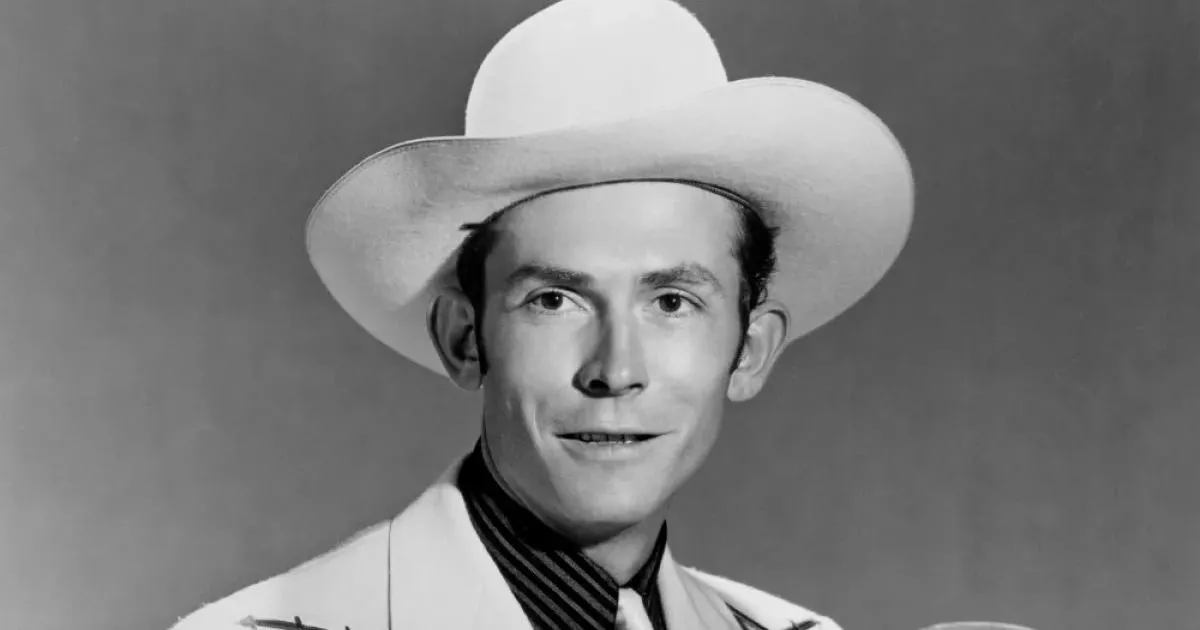How Hank Williams built a successful career. Explore key moments that defined the journey.
Hank Williams was a highly influential American singer-songwriter of the 20th century. He achieved significant success with 55 singles reaching the Billboard Country & Western Best Sellers chart's top 10, including 12 number-one hits. Even after his death, his music continued to resonate, with five posthumously released singles also reaching the top 10. Williams' impact on country music remains profound.
July 1937: Name Change and Talent Show Win
In July 1937, Hank Williams informally changed his name from Hiram to Hank, and won a talent show at the Empire Theater singing his original song "WPA Blues".
October 1939: Williams Drops Out of School
In October 1939, Hank Williams dropped out of school so that he and the Drifting Cowboys could work full-time.
August 1942: Firing from WSFA
In August 1942, Hank Williams was fired from WSFA radio for "habitual drunkenness", a consequence of his worsening alcoholism.
1942: Employment at Alabama Drydock and Shipbuilding Company
In 1942, Hank Williams started working as a shipfitter's helper for the Alabama Drydock and Shipbuilding Company in Mobile.
1945: Return to Radio and Songbook Publication
In 1945, Hank Williams returned to WSFA radio in Montgomery and published his first songbook, Original Songs of Hank Williams, which contained original songs and one non-original song.
September 14, 1946: Audition for Grand Ole Opry and signing with Acuff-Rose Music
On September 14, 1946, Hank Williams auditioned for the Grand Ole Opry in Nashville but was rejected. Following this, Hank and Audrey Williams approached Fred Rose at Acuff-Rose Music, leading to a six-song contract and subsequently, a deal with Sterling Records.
December 11, 1946: First Recording Session
On December 11, 1946, Hank Williams had his first recording session where he recorded "Wealth Won't Save Your Soul", "Calling You", "Never Again (Will I Knock on Your Door)", and "When God Comes and Gathers His Jewels".
1947: "Move It On Over" Release and Louisiana Hayride
In 1947, Hank Williams released the hit single "Move It On Over" and joined the Louisiana Hayride radio program, marking a significant step in his career.
1947: Signing with MGM Records and Release of "Move It on Over"
In 1947, Hank Williams signed with MGM Records and released "Move It on Over", which became a country hit.
1948: Joining the Louisiana Hayride
In 1948, Hank Williams moved to Shreveport, Louisiana, and joined the Louisiana Hayride, a radio show broadcast on KWKH. He got a program on the station and bookings to perform across western Louisiana and eastern Texas.
June 11, 1949: Grand Ole Opry Debut
On June 11, 1949, Hank Williams made his debut at the Grand Ole Opry, receiving six encores. That year, he formed the most famous version of the Drifting Cowboys and Audrey Williams gave birth to Hank Williams Jr.
1949: Success of "Lovesick Blues" and signing with Oscar Davis
In 1949, Hank Williams released his version of "Lovesick Blues", which became a number one hit on the Billboard charts for four months. Following the success of this and "Wedding Bells", Williams signed a management contract with Oscar Davis.
1949: Broadcast of Health & Happiness Show
Recordings of Hank Williams for the Health & Happiness Show were broadcast in 1949, promoting Hadacol.
1950: Recording as "Luke the Drifter"
In 1950, Hank Williams began recording moral-themed songs as "Luke the Drifter" to differentiate these recitations from his honky-tonk music. His real identity was supposed to be unknown, but he often performed the material on stage.
1950: Airing of The Garden Spot Programs
In 1950, the Garden Spot Programs, a series of publicity segments for plant nursery Naughton Farms, originally aired featuring Hank Williams.
November 14, 1951: Television Debut on the Perry Como Show
On November 14, 1951, Hank Williams appeared on television for the first time with Perry Como on CBS's Perry Como Show in New York, where he sang "Hey Good Lookin'".
1951: Recording for March of Dimes
Hank Williams made a recording for the 1951 March of Dimes campaign.
1951: Release of Hit Songs and Pop Cover of "Cold, Cold Heart"
In 1951, Hank Williams released more hit songs and his B-side, "Cold, Cold Heart", became one of his most recognized songs after Tony Bennett released a pop cover that stayed on the charts for 27 weeks, peaking at number one.
1951: Williams Hosts Radio Show for Mother's Best Flour
In 1951, Williams hosted a 15-minute show for Mother's Best Flour on WSM radio. Some shows were pre-recorded due to tour schedules.
June 1952: Recording Session and Meeting Billie Jean Jones
In June 1952, Hank Williams recorded several songs and met Billie Jean Jones at the Grand Ole Opry, initiating a relationship that caused him to miss Grand Ole Opry appearances.
August 11, 1952: Dismissal from the Grand Ole Opry
On August 11, 1952, Hank Williams was dismissed from the Grand Ole Opry due to habitual drunkenness and missing shows.
September 1952: Writing and Recording of "Your Cheatin' Heart"
In September 1952, Hank Williams wrote and recorded "Your Cheatin' Heart".
September 23, 1952: Last Recording Session
During his last recording session on September 23, 1952, Hank Williams recorded "Kaw-Liga", "Your Cheatin' Heart", "Take These Chains from My Heart", and "I Could Never Be Ashamed of You".
November 1952: Release of "I'll Never Get Out of This World Alive"
In November 1952, Hank Williams's final single, "I'll Never Get Out of This World Alive", was released while he was still alive.
1952: Divorce, Remarriage, and Opry Dismissal
In 1952, Audrey divorced Hank Williams, and he married Billie Jean Jones. Also in 1952, he was dismissed by the Grand Ole Opry due to unreliability and alcoholism.
1952: Appearances on The Kate Smith Evening Hour and Extramarital Affair
In the spring of 1952, Hank Williams appeared on two episodes of The Kate Smith Evening Hour. During the same year, he had a brief extramarital affair with Bobbie Jett, which resulted in the birth of their daughter, Jett Williams.
December 31, 1952: Scheduled Performance in Charleston
On December 31, 1952, Hank Williams was scheduled to perform at the Municipal Auditorium in Charleston, West Virginia, but a snowstorm prevented him from flying. He hired a driver instead.
January 1953: MGM Records Reduced Releases Due to Demand for Williams's Music
In January 1953, MGM Records reduced their planned releases from 12 to 6 to meet the high demand for Hank Williams's music. The label also had 3,000 direct requests for pictures of the singer.
January 1953: Posthumous Release of "Your Cheatin' Heart"
In late January 1953, after Hank Williams's death, "Your Cheatin' Heart" was released. The song, backed by "Kaw-Liga", topped the country charts for six weeks.
April 1953: Release of "Take These Chains From My Heart"
In April 1953, "Take These Chains From My Heart" was released and reached No. 1 on the country charts.
April 1953: Production Backlog at MGM Pressing Plant
In April 1953, MGM Records estimated that back orders of Hank Williams's records, and those by other artists would cover the production of their Bloomfield, New Jersey, pressing plant until April 1953.
1963: Wesley Rose Contacts Irene Regarding Copyright Renewals
In 1963, Wesley Rose contacted Irene regarding the copyright renewals with Acuff-Rose. Rose offered US$25,000, which Irene accepted to prevent Williams's daughter from making a claim in the future.
1966: Alabama Judge Confirms Irene Williams's Guardianship
In 1966, an Alabama judge determined that the guardianship of Williams's estate belonged to Irene Williams, and confirmed the validity of the copyright renewal deal. Cathy's adoptive parents were contacted by a lawyer, but they refused to contest the ruling.
October 22, 1975: Billie Jean Horton Ruled Common-Law Wife
On October 22, 1975, a federal judge in Atlanta, Georgia, ruled that Billie Jean Horton was Williams's common-law wife, and that part of the copyright renewals of the songs belonged to her.
1993: Release of "Health & Happiness Show" Recordings
In 1993, a double-disc set of Hank Williams's recordings for the "Health & Happiness Show" was released, originally broadcast in 1949 for the promotion of Hadacol.
1997: Lawsuit to Block Release of Recordings
In 1997, The Legacy Entertainment Group was sued by PolyGram and the heirs of Williams to block the release of recordings. A lawyer for Legacy Entertainment Group attempted to prevent the heirs of Williams from releasing the recordings. The Universal Music Group then claimed ownership of the shows.
January 2006: Court Upholds Heirs' Rights to Recordings
In January 2006, the Tennessee Court of Appeals upheld a lower court ruling stating that Williams's heirs, including son Hank Williams Jr. and daughter Jett Williams, have the sole rights to sell his recordings.
2008: Time-Life Releases 'Unreleased Recordings'
In 2008, Time-Life released "Unreleased Recordings", a selection of numbers pertaining to the Mother's Best Flour shows.
April 12, 2010: Posthumous Pulitzer Prize Special Citation
On April 12, 2010, the Pulitzer Prize Board awarded Hank Williams a posthumous special citation for his contributions to country music.
2010: Posthumous Pulitzer Prize Special Citation
In 2010, Hank Williams was posthumously awarded a Pulitzer Prize Special Citation for his songwriting and its impact on country music.
2010: Time-Life Releases 'The Complete Mothers' Best Recordings... Plus!'
In 2010, Time-Life released a 15-CD box-set containing all of the recordings remastered by sound engineer Joe Palmaccio entitled "The Complete Mothers' Best Recordings... Plus!".
October 4, 2011: Release of "The Lost Notebooks of Hank Williams"
On October 4, 2011, the album "The Lost Notebooks of Hank Williams" was released, featuring contributions from various artists, including Bob Dylan and Holly Williams.
2011: Re-release of "Health & Happiness Show" as "The Legend Begins"
In 2011, the "Health & Happiness Show" set was re-released as "Hank Williams: The Legend Begins", including unreleased songs and early recordings.
May 2014: Release of "The Garden Spot Programs, 1950" Radio Recordings
In May 2014, further radio recordings by Hank Williams were released as "The Garden Spot Programs, 1950", a series of publicity segments for Naughton Farms originally aired in 1950.
2024: Value of Talent Show Prize in 2024
In July 1937, Hank Williams won a talent show with a first prize of US$15, equivalent to $300 in 2024, after singing his original song "WPA Blues".
Mentioned in this timeline

Bob Dylan is a highly influential American singer-songwriter renowned as...
CBS Broadcasting Inc CBS is a prominent American commercial broadcast...
California is a U S state on the Pacific Coast...

Sony is a Japanese multinational conglomerate based in Tokyo Its...

Christmas is an annual festival celebrated on December th commemorating...

Inflation in economics signifies an increase in the average price...
Trending
1 month ago Prince George's Royal Debut: Joins Kate, King Charles at Remembrance Festival.

A meteor shower is a celestial event where numerous meteors appear to radiate from a single point in the night...

2 months ago Michael J. Fox Reflects on 'Teen Wolf' and 'Back to the Future' in Memoir.
6 days ago Jeremy O. Harris, 'Emily in Paris' Actor, Arrested in Japan for Drug Smuggling
Maribel Guardia a Costa Rica-Mexican actress gained initial recognition as Miss Costa Rica and subsequently participated in Miss Universe She...

1 month ago Tucker Carlson faced criticism from Ben Shapiro amidst Heritage staff shakeup and antisemitism concerns.
Popular

Candace Owens is an American conservative political commentator and author...

XXXTentacion born Jahseh Dwayne Ricardo Onfroy was a controversial yet...

Ilhan Omar is an American politician currently serving as the...
Matt and Ross Duffer known as the Duffer Brothers are...

Tom Cotton is an American politician and Army veteran currently...
The Kennedy Center Honors are annual awards recognizing individuals and...
